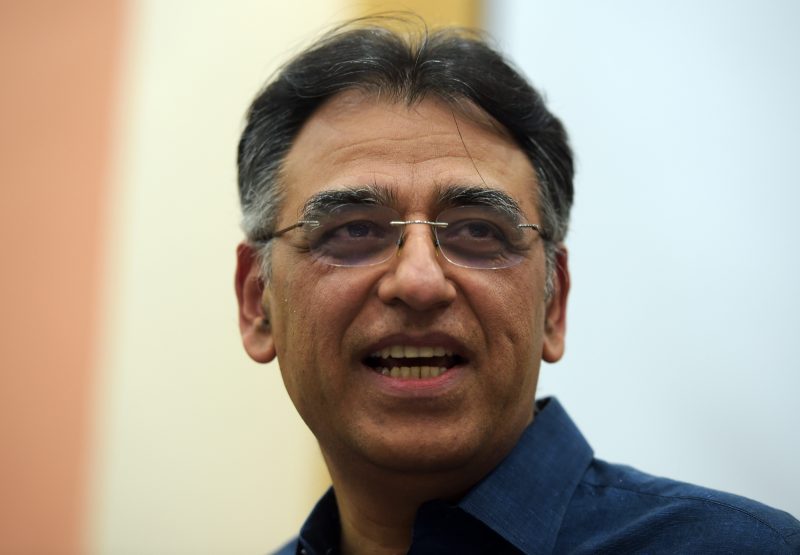Pakistan’s finance minister quits as cabinet shuffled before IMF deal
Asad Umar was one of Imran Khan’s most powerful ministers (AAMIR QURESHI)
Islamabad (AFP) – Pakistan’s finance minister Asad Umar stepped down in a cabinet shuffle Thursday as Islamabad seeks a crucial bailout deal with the International Monetary Fund.
The government named Abdul Hafeez Sheikh, a former World Bank official who was Pakistan’s finance minister from 2010-2013, as “adviser on finance” replacing Umar, the Dawn newspaper and other media reported.
Umar, one of cricketer-turned-premier Imran Khan’s most powerful ministers, had been entrusted with the task of negotiating the long-delayed bailout as Pakistan’s cash-strapped economy faces a balance-of-payments crisis.
His abrupt resignation comes with Khan’s government, which came to power last year, under growing pressure. The rupee has lost 30 percent of its value since the start of 2018, stirring sharp inflation.
“As part of a cabinet reshuffle, PM desired that I take the energy minister portfolio instead of finance,” Asad Umar tweeted.
“However, I have obtained his consent to not take any cabinet position. I strongly believe @ImranKhanPTI is the best hope for Pakistan and inshallah (God willing) will make a naya (new) pakistan,” he wrote before full details emerged of the cabinet shuffle involving several ministers.
A new finance minister will have to look after a “difficult economy”, Umar told a hastily assembled press conference in the capital Islamabad shortly after the tweet announcing his resignation.
“We need to take some difficult decisions and we need to show some patience,” he said, appealing to the public to “stand with” the new finance minister.
“Don’t expect that there will be miracles and rivers of honey and milk will start flowing in the next three months,” he warned.
– ‘Tough decisions’ –
Economist Muzammil Aslam said Umar had taken “tough decisions” to fix the economy.
“In my view, he has become a political victim and a scapegoat to neutralise the pressure,” said Aslam, who heads Emerging Economics Research, a Karachi-based company.
Pakistan has gone to the IMF repeatedly since the late 1980s, and last received an IMF bailout in 2013 worth $6.6 billion.
Earlier this week Hammad Azhar, a state minister for revenue, tweeted that Umar had reached an “agreement in principle” on an IMF deal to be finalised later this month.
But experts have warned that any tough measures imposed by the IMF could impact Khan’s grand plans for an Islamic welfare state in Pakistan.
An IMF forecast suggests the Pakistani economy is likely to grow at around 2.9 percent for the fiscal year ending June 2019, compared to 5.8 percent growth in the last fiscal year.
The government is already suffering a backlash. The rupee has been repeatedly devalued, sending inflation to 9.4 percent, as discontent rises along with prices of consumer goods.
The United Arab Emirates, Pakistan’s largest trading partner in the Middle East and a major investment source, recently offered $3 billion to support Pakistan’s battered economy.
Islamabad also secured $6 billion in funding from Saudi Arabia and struck a 12-month deal for a cash lifeline during Khan’s visit to the kingdom in October.
It has also received billions of dollars in Chinese loans to finance ambitious infrastructure projects.
At the press conference, Umar dismissed rumours which rapidly began circulating about his removal in a country which has long been caught in a tussle between civilian and military power.
“I am not aware of any conspiracies,” he said, adding that he will remain in Khan’s Pakistan Tehreek-e-Insaf party.
Pakistani media reported that, among other changes, retired Intelligence Bureau Brigadier Ijaz Shah became Interior Minister.
In 2010 Shah was barred from leaving the country after a United Nations report found authorities deliberately failed to investigate the December 2007 attack which killed former prime minister Benazir Bhutto and, the report said, could have been prevented it.
Disclaimer: Validity of the above story is for 7 Days from original date of publishing. Source: AFP.


